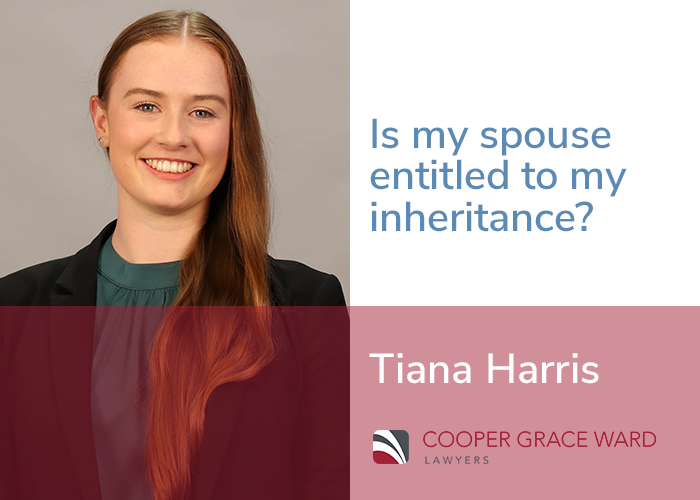If you are the inheriting spouse, we’ve got some bad news: your inheritance is not in a protected class of assets that will be automatically quarantined from the property pool when you separate.
So, what can you do to protect your inheritance?
CGW family lawyer Tiana Harris explains.
VIDEO TRANSCRIPT
Hi, I’m Tiana, and I’m a lawyer in the family law team here at Cooper Grace Ward. Today, I’m going to be speaking about inheritances, which are usually a touchy subject when negotiating a final property settlement. Usually in the course of exchanging disclosure, the other side will ask for any documents that you have in relation to the inheritance that you have received. This will include the deceased person’s Will. The bad news for the inheriting spouse is that an inheritance is not a protected class of assets and is not automatically quarantined from the property pool. So, the courts have a wide discretion about how to deal with inheritances and they usually adopt one of two approaches.
Approach one – quarantine the inheritance from the property pool
The first approach is to quarantine the inheritance from the property pool. This means that there will be two pools of assets, and the first pool will include the inheritance and the inheriting spouse will receive that in full. The second pool will include assets to be divided between the parties based on their contributions and future factors.
Approach two – include the inheritance in the property pool for division between the parties
The second approach is to include the inheritance in the property pool for division between the parties. This means that the person receiving the inheritance will receive a credit for their contribution of that inheritance to the property pool, except in very unusual circumstances, but that by no means means that they will receive a dollar-for-dollar adjustment for that inheritance.
Practical tips
The first approach is usually only adopted when the inheritance was received very late in the relationship or post-separation. This is because the property does not crystallise at the time you separate, but rather the court will take it at the time of trial or the date that the parties reached an agreement. So, in terms of practical tips in relation to an inheritance, if you think that you are about to receive an inheritance and you are still in a happy relationship, then you might want to consider entering into a financial agreement, which is the highest the law has to offer in terms of quarantining your inheritance.
The other thing is, if you’ve just separated from your partner and you think that you might receive an inheritance shortly, you should finalise your property settlement as soon as possible. That way, you might not have inherited an interest in the estate, but rather an expectation that you will receive an inheritance in the future. The other thing to think about is more for your parents, grandparents and all the family members is good estate planning and how that can mean an inheritance does not form part of your property pool. If you have separated and you have just received an inheritance, the court will likely adopt the approach that the inheritance will be excluded from the pool for division between the parties if you self-quarantine that inheritance and by that, I mean, if you receive money, you should put that money into a bank account and don’t touch it. And if you receive real property such as a home, you should make sure that the other partner does not make any contributions, such as mortgage repayments or any monies towards renovating the property.
If you have any questions about inheritances, please do not hesitate to contact me or one of the other family lawyers here at Cooper Grace Ward.






